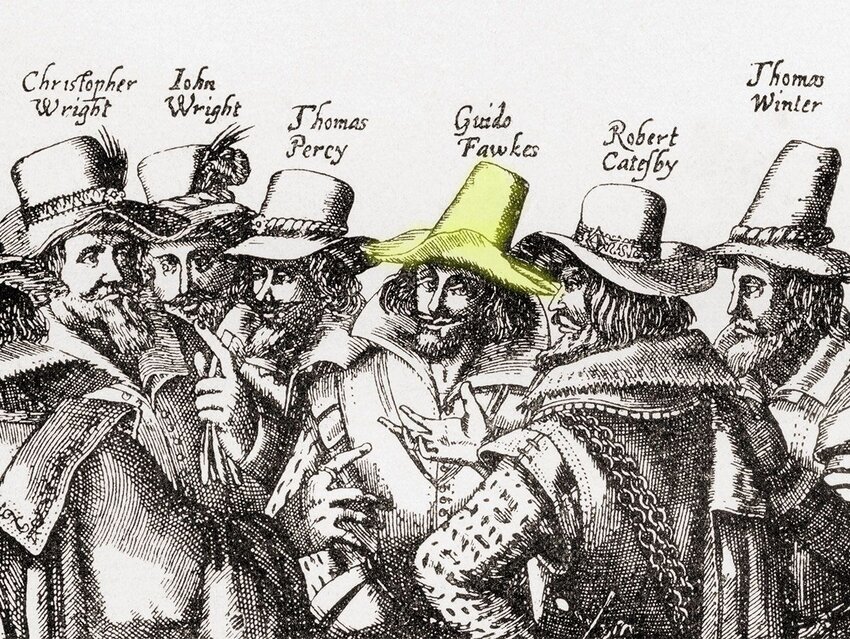At the turn of the 17th century, a group of English Catholics — tired of religious persecution and determined to end Protestant rule in England — plotted to dispose of King James I. They rented a space beneath the Palace of Westminster and filled it with 36 barrels of gunpowder, enough to destroy the House of Lords. As conspirators gave vague warnings to their friends to avoid Parliament, word made its way to the authorities. In the early hours of November 5, 1604, royal guards discovered the barrels, along with co-conspirator Guy Fawkes just as he was about to light the fuse, thereby thwarting the bombing. More than 400 years later, when we say, “Hey, guys!” or ask, “Do you know that guy?” we’re paying tribute to this original “Guy,” albeit in dramatically more casual situations.
Make Way for the Bad Guy
Guy Fawkes wasn’t the mastermind of the Gunpowder Plot (as it came to be known), but being the one caught red-handed, he quickly became its figurehead. Of all the conspirators, his execution was saved for last. In the aftermath of the political upheaval and executions, Parliament declared November 5 to be a day of thanksgiving, first celebrated in 1606. Still honored today, Guy Fawkes Night, or Bonfire Night, features large burning pyres dotting the English countryside while fireworks light up the sky.
These conflagrations are where Guy Fawkes transformed from historical figure to lexicon staple. As part of the Bonfire Night festivities, revelers prepare effigies of the would-be bomber, parade them through the streets, and then feed them into the flames. These figures, called “guys,” are typically rough-hewn and crude; they are destined for a short life and a fiery end. The coarse Fawkes likenesses became so pervasive that the British began using the term “guys'' to describe any "grotesquely or poorly dressed person."
One of the oldest-known written instances of this usage was made by Julia Charlotte Maitland in an 1836 letter describing a sea voyage to India: “The gentlemen are all ‘rigged Tropical,’ with their collars turned down, and small matters of neckcloths; – grisly Guys some of them turn out!” Notice the capital “G” — a link to the historical “Guy.”
By the time Charles Reade published the novel Hard Cash in 1863, the “g” had gone lowercase: “...but I wouldn't speak to you in the street for fear of disgracing you. I'm such a poor little guy to be addressing a gentleman like you.” While Reade doesn’t use “guy” as a proper noun, it still carries an unfavorable undertone. However, before long, the previous negative connotations drifted away, and “guy” became synonymous with a neutral “man” or “fellow.”
One of the Guys
This broad interpretation of “guy” became even broader by the mid-20th century, when women began to fall under the “guys” umbrella. Some feminist thinkers have pushed back against this creeping definition. Author and activist Alice Walker (The Color Purple) describes it as troubling when women refer to themself as “guys” because it demonstrates a “fear of being feminine.”
Addressing the “creeping sexism” of gendered language, Jeane Anastas, a professor of social work at the NYU Silver School of Social Work, said in an email, “Whatever Webster's dictionary says about the plural 'guys' ['used in plural to refer to the members of a group regardless of sex'] and despite the fact that I sometimes catch myself saying 'you guys' to people of all genders, 'guy' is a gendered word.”
Some explicitly non-gendered replacements for “guys” include “friends,” “folks,” and the Southern contribution, “y’all.”
Featured image credit: Universal History Archive/ Universal Images Group via Getty Images

